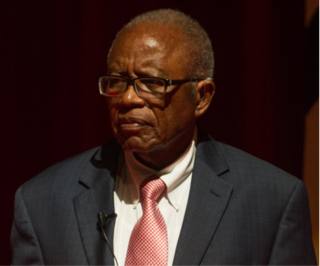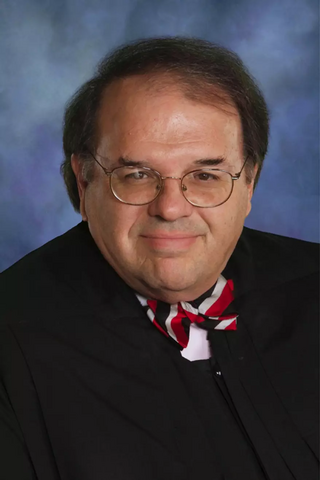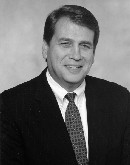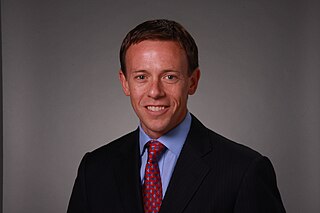Roe v. Wade, 410 U.S. 113 (1973), was a landmark decision of the U.S. Supreme Court in which the Court ruled that the Constitution of the United States protected a right to have an abortion. The decision struck down many abortion laws, and it sparked an ongoing abortion debate in the United States about whether, or to what extent, abortion should be legal, who should decide the legality of abortion, and what the role of moral and religious views in the political sphere should be. The decision also shaped debate concerning which methods the Supreme Court should use in constitutional adjudication.

Theodore "Ted" Bevry Olson was an American lawyer who served as the 42nd solicitor general of the United States from 2001 to 2004 in the administration of President George W. Bush. He previously served as the Assistant Attorney General of the Office of Legal Counsel of the U.S. Department of Justice from 1981 to 1984 under President Ronald Reagan, and he was also a longtime partner at the law firm Gibson Dunn.

Randy Evan Barnett is an American legal scholar. He serves as the Patrick Hotung Professor of Constitutional Law at Georgetown University, where he teaches constitutional law and contracts, and is the director of the Georgetown Center for the Constitution.

Ira William McCollum Jr. is an American lawyer and Republican Party politician. He was a member of the United States House of Representatives from 1981 to 2001, representing Florida's 5th congressional district, which was later redistricted to the 8th congressional district in 1993. As a member of the House, McCollum rose to become Vice Chairman of the House Republican Conference, the fifth-highest ranking position in the House Republican leadership. He voted to impeach President Bill Clinton and subsequently took a leadership role in managing Clinton's trial in the Senate, which ended in acquittal.

Samuel Anthony Alito Jr. is an American jurist who serves as an associate justice of the Supreme Court of the United States. He was nominated to the high court by President George W. Bush on October 31, 2005, and has served on it since January 31, 2006. After Antonin Scalia, Alito is the second Italian American justice to serve on the U.S. Supreme Court.

David B. Kopel is an American author, attorney, gun rights advocate, and contributing editor to several publications.

Fred David Gray is an American civil rights attorney, preacher, activist, and state legislator from Alabama. He handled many prominent civil rights cases, such as Browder v. Gayle, and was elected to the Alabama House of Representatives in 1970, along with Thomas Reed, both from Tuskegee. They were the first black state legislators in Alabama in the 20th century. He served as the president of the National Bar Association in 1985, and in 2001 was elected as the first African-American President of the Alabama State Bar.

Richard J. Leon is an American jurist who serves as a senior United States district judge of the United States District Court for the District of Columbia.

Matthew George Whitaker is an American lawyer, lobbyist and politician who served as acting United States Attorney General from November 2018 to February 2019. He was appointed to that position by President Donald Trump after Jeff Sessions resigned at Trump's request. Whitaker had previously served as Chief of Staff for Jeff Sessions from October 2017 to November 2018.

Elizabeth Price Foley is a conservative American legal theorist who writes and comments in the fields of constitutional law, bioethics, and health care law. She is a Professor of Law at Florida International University College of Law, a public law school located in Miami, Florida. She also serves as Counsel to the Washington, D.C. office of BakerHostetler, LLP, where she practices constitutional, appellate, and food and drug law.

Thomas Edward Perez is an American politician and attorney currently serving as senior advisor to the president of the United States and director of the White House Office of Intergovernmental Affairs, holding both positions since June 2023. Perez previously served as the United States Secretary of Labor (2013–2017), the chair of the Democratic National Committee (2017–2021), and United States Assistant Attorney General for Civil Rights (2009–2013).
BakerHostetler is an American law firm founded in 1916. One of the firm's founders, Newton D. Baker, was U.S. Secretary of War during World War I, and former Mayor of Cleveland, Ohio.

Joe Dally Whitley is an American lawyer from Georgia who was the first General Counsel for the United States Department of Homeland Security. He works in private practice at Womble Bond Dickinson (US) LLP and has been named a Super Lawyer, listed in The Best Lawyers in America®, named a ‘’2019 Lawyer of the Year’’, is AV® Preeminent™ Peer Review Rated by Martindale-Hubbell, and listed in Chambers USA: America's Leading Business Lawyers.

David William Ogden, known professionally as David W. Ogden is an American lawyer who served as the deputy attorney general of the United States. An American lawyer, Ogden was also a high-ranking official in the United States Department of Justice and the United States Department of Defense during the administration of President Bill Clinton.

Joseph W. Jacquot is the general counsel to the governor of the State of Florida. Previously Jacquot was the chief deputy attorney general of the State of Florida from 2007 to 2011. He successfully argued before the United States Supreme Court in the landmark Miranda warning case Florida v. Powell and initiated the constitutional lawsuit against the Affordable Care Act ("Obamacare").
Robert J. Muise is an American attorney who specializes in constitutional law litigation. Along with attorney David Yerushalmi, he is co-founder and Senior Counsel of the American Freedom Law Center (AFLC). Before launching AFLC, Muise was Senior Trial Counsel at the Ann Arbor-based Thomas More Law Center, a conservative Christian law firm founded by Domino's Pizza founder Tom Monaghan.
National Federation of Independent Business v. Sebelius, 567 U.S. 519 (2012), is a landmark United States Supreme Court decision in which the Court upheld Congress's power to enact most provisions of the Patient Protection and Affordable Care Act (ACA), commonly called Obamacare, and the Health Care and Education Reconciliation Act (HCERA), including a requirement for most Americans to pay a penalty for forgoing health insurance by 2014. The Acts represented a major set of changes to the American health care system that had been the subject of highly contentious debate, largely divided on political party lines.
Since the passage of the Affordable Care Act (ACA), there have been numerous actions in federal courts to challenge the constitutionality of the legislation. They include challenges by states against the ACA, reactions from legal experts with respect to its constitutionality, several federal court rulings on the ACA's constitutionality, the final ruling on the constitutionality of the legislation by the U.S. Supreme Court in National Federation of Independent Business v. Sebelius, and notable subsequent lawsuits challenging the ACA. The Supreme Court upheld ACA for a third time in a June 2021 decision.
United States House of Representatives v. Azar, et al. was a lawsuit in which the United States House of Representatives sued departments and officials within the executive branch, asserting that President Barack Obama acted illegally in his implementation of the Patient Protection and Affordable Care Act. The lawsuit was touted by House Speaker John Boehner, and asserted that President Obama exceeded his constitutional authority in delaying the implementation of the employer mandate of the Affordable Care Act and also addressed "Republican opposition to an estimated $175 billion in payments to insurance companies over the next 10 years as part of a cost-sharing program under the healthcare law."

Kenneth Kiyul Lee is a South Korean-born American lawyer who serves as a United States circuit judge of the United States Court of Appeals for the Ninth Circuit.














